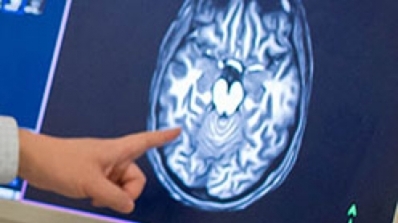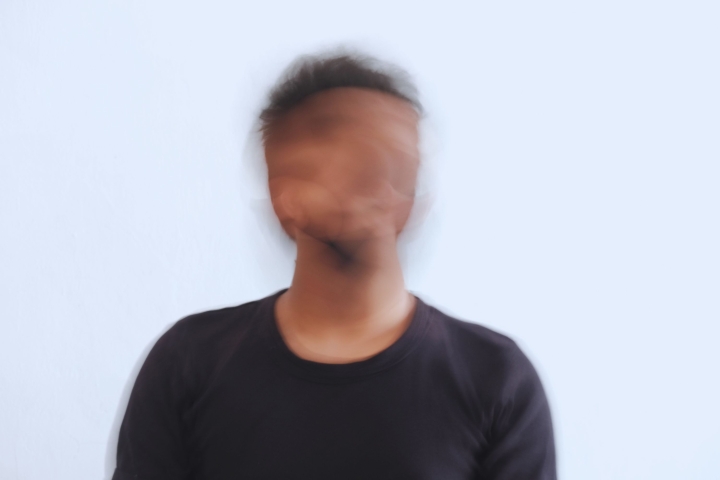COVID-19 can cause difficulty recognizing faces and navigational problems, according to a new Dartmouth study in Cortex.
It’s widely known that COVID-19 can cause a range of neurological problems, including the loss of smell and taste, and impairments in attention, memory, speech, and language, known as “brain fog.” The Dartmouth study is the first to report prosopagnosia, also known as face blindness, following symptoms consistent with COVID-19.
The researchers worked with Annie, a 28-year-old customer service representative and part-time portrait artist who was diagnosed with COVID-19 in March 2020 and suffered a symptom relapse two months later. Shortly after the relapse, Annie noticed difficulty with face recognition and navigation.
“When I first met Annie, she told me that she was unable to recognize the faces of her family,” says lead author Marie-Luise Kieseler, a Guarini School of Graduate and Advanced Studies doctoral student in the Department of Psychological and Brain Sciences and member of the Social Perception Lab at Dartmouth.
Annie recounted the time when she was at a restaurant meeting her family for the first time after having COVID-19. She didn’t recognize them, and when she walked past them again, her father called out to her. “It was as if my dad’s voice came out of a stranger’s face,” says Annie, who now relies on voices to recognize people that she knows.
Annie also experienced navigational deficits after having COVID-19. She has had difficulty remembering where particular sections in her grocery store are and relies on Google maps and its pin function to remember where she parks her car.
“The combination of prosopagnosia and navigational deficits that Annie had is something that caught our attention because the two deficits often go hand in hand after somebody either has had brain damage or developmental deficits,” says senior author Brad Duchaine, a professor of psychological and brain sciences and principal investigator of the Social Perception Lab. “That co-occurrence is probably due to the two abilities depending on neighboring brain regions in the temporal lobe.”
The research team conducted a series of tests with Annie to evaluate her problems with face recognition and determine whether she also has difficulties with other perceptual or cognitive abilities.

Recognizing familiar faces and learning the identities of unfamiliar faces was especially challenging for Annie. For one of the tests, Annie was sequentially presented with 60 images of celebrity faces and was asked to name them. Afterward, she was presented with a list of the celebrities featured in the test to see if she knew them. Annie correctly identified 29% of the 48 celebrities whom she was familiar with as compared to most people, who can correctly identify 84% of familiar celebrities.
The second test involved a doppelganger. Annie was shown a celebrity’s name and then presented with images of two faces: the face of a celebrity and that of someone similar, and was then asked to identify which was the famous person. She identified the celebrity in 69% of the 58 trials, as compared to 87% in the control group.
Annie’s more limited ability to learn and then recognize unfamiliar faces was demonstrated using the Cambridge Face Memory Test. In the test, participants learn six men’s faces and then are asked to discriminate between the learned faces and other faces. On average, people are usually able to identify 80% correctly while Annie was only able to identify 56% correctly.
“Our results from the test with unfamiliar faces show that it wasn’t just that Annie couldn’t recall the name or biographical information of a famous person that she was familiar with, but she really has trouble learning new identities,” says Kieseler.
Annie’s test scores in face detection, face identity perception, and object recognition were normal, indicating respectively, that her problems with faces are due to face memory deficits and are not a more generalized impairment.
Annie had flawless test scores in scene processing. When she was shown a set of landscapes and was then shown them again with a new set, she made no errors in identifying the landscapes she had been previously shown. “It’s likely, therefore, that her navigational impairments result from processes that might contribute to cognitive map representation rather than scene recognition deficits,” says Kieseler.
“This sort of dissociation like we’re seeing in Annie is seen in some people who have navigational deficits, where they can recognize where they are but when they’re asked where another place is relative to where they are right now, they struggle,” says Duchaine. “They have trouble understanding relationships between different places, which is a step beyond recognizing the place that you’re in.”
Annie also did really well in voice recognition tests in comparison to the controls, so the researchers think that her problems with face processing are mostly likely due to a deficit within the visual system.
“It’s been known that there are broad cognitive problems that can be caused by COVID-19, but here we’re seeing severe and highly selective problems in Annie,” says Duchaine, “and that suggests there might be a lot of other people who have quite severe and selective deficits following COVID.”
To determine if other people have experienced perception, recognition, and navigational problems due to long COVID, the research team obtained self-reported data from 54 individuals who had long COVID with symptoms for 12 weeks or more, and from 32 people who had reported that they had fully recovered from COVID-19.
Respondents were asked to rate themselves on statements about their visual perception and cognitive functioning, such as whether they could track characters on TV or navigate their environment, before and after they had contracted COVID-19. The research team measured the change in the before-and-after ratings and compared results of the long COVID group to that of the fully recovered COVID group.
“Most respondents with long COVID reported that their cognitive and perceptual abilities had decreased since they had COVID, which was not surprising, but what was really fascinating was how many respondents reported deficits,” says Kieseler. “It was not just a small concentration of really impaired cases but a broad majority of people in the long COVID group reported noticeable difficulties doing things that they were able to do before contracting COVID-19 without any problems.”
“One of the challenges that many respondents reported was a difficulty with visualizing family and friends, which is something that we often hear from prosopagnosics,” says Duchaine, who is the co-founder of faceblind.org.
“Our study highlights the sorts of perceptual problems with face recognition and navigation that can be caused by COVID-19—it’s something that people should be aware of, especially physicians and other health care professionals.”
Duchaine says, “As far as we know, nobody’s measured the sorts of high level, visual processing abilities that are affected by COVID-19 that we focused on here in this paper, so if it’s happening in the visual system, it’s likely that selective deficits due to problems in other brain areas are occurring in some people as well.”
Individuals experiencing perceptual or vision problems or navigational difficulties that they think may be caused by COVID-19 are welcome to contact the research team, who hope to do more research in this area. The Prosopagnosia Research Center has more information about problems with face recognition and other visual processing difficulties.

